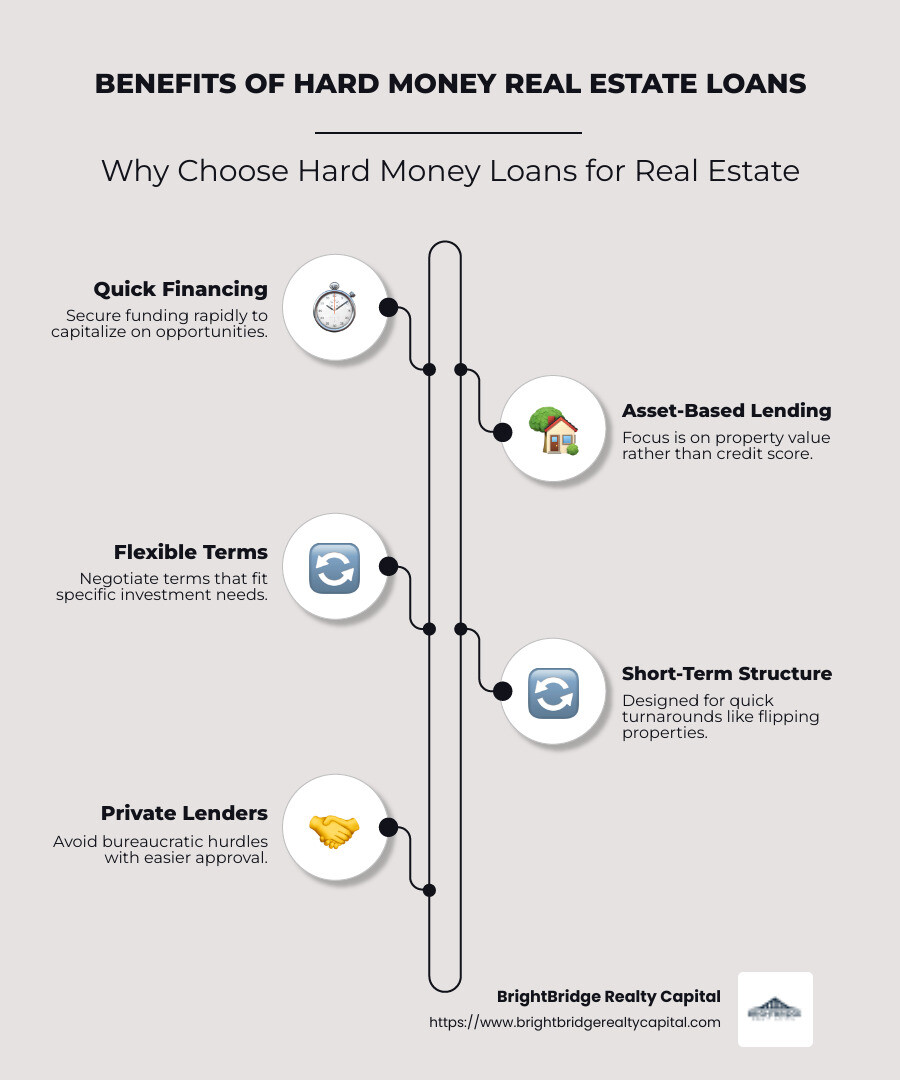Hard Money Loans: Bridging the Gap in Real Estate Financing

Hard money real estate loans are becoming the go-to solution for many real estate investors seeking quick and flexible financing to seize lucrative opportunities. These loans, often known for their speed and simplicity, serve as a financial bridge specifically designed for asset-based investments.
If you're looking for:
Quick Financing: Ideal for investors who need to secure funding fast to close deals.
Real Estate Investment: Custom for flipping properties or expanding rental portfolios.
Asset-Based Loans: Focus on the property's value rather than the borrower's credit score.
Hard money real estate loans are short-term, collaterally-backed loans offered by private lenders, providing a swift path to financing with less focus on traditional credit metrics.
Real estate investors, those keen on pivoting quickly in a dynamic market like New York, often find the speed and flexibility of these loans invaluable. They provide the capital required to purchase, renovate, and flip properties efficiently without the bureaucratic problems of traditional loans.

Related content about Hard money real estate loans:
Understanding Hard Money Real Estate Loans
Hard money real estate loans are distinct from traditional financing options. They're all about speed, flexibility, and asset-based lending. Let's break down what makes them unique.
Key Features of Hard Money Loans
Short-Term Loans: Hard money loans are designed to be temporary. Typically, they last between six months to three years. This short term is perfect for investors looking to flip houses quickly or bridge a financial gap.
Collateral-Based: Unlike traditional loans, which rely heavily on a borrower's creditworthiness, hard money loans are secured by real property. This means the lender is more interested in the property's value than your credit score.
Private Lenders: These loans come from private individuals or companies, not banks. This can mean more personalized service and terms that are negotiable. Private lenders often see value in what banks might consider risky ventures.
Fast Approval: One of the biggest advantages is speed. While traditional loans can take months to approve, hard money loans can often be secured in as little as 10 business days. This quick turnaround is crucial for investors who need to act fast.
High Interest Rates: The trade-off for speed and flexibility is cost. Interest rates on hard money loans typically range from 10% to 18%, significantly higher than traditional mortgages. This reflects the increased risk private lenders take on.
Flexible Terms: Loan terms can often be custom to fit the borrower's needs. Whether it's the repayment schedule or the specific conditions of the loan, flexibility is a key feature that attracts many investors.
How Hard Money Loans Differ from Traditional Loans
Credit Checks: Traditional lenders place a heavy emphasis on credit scores and credit history. Hard money lenders, however, may skip the hard credit checks altogether, focusing instead on the property's value.
Loan-to-Value Ratio (LTV): Hard money loans usually offer 65% to 75% of the property's current value. This is lower than traditional loans, which might offer up to 80% or more. The lower LTV is another way lenders protect themselves against risk.
Approval Process: The approval process for hard money loans is streamlined and less bureaucratic. With fewer documentation requirements, borrowers can secure funding quickly, a crucial advantage in competitive markets like New York.
Hard money real estate loans provide a fast, flexible, and asset-focused financing solution for real estate investors. While they come with higher costs, their speed and adaptability make them an attractive option for those looking to capitalize on investment opportunities swiftly.
Common Uses for Hard Money Loans
Hard money real estate loans have become a popular choice among real estate investors for several compelling reasons. Let's explore how these loans are commonly used.
Flipping Houses with Hard Money Loans
House flipping is one of the most prevalent uses for hard money loans. Why? Because these loans offer the quick turnaround needed to buy, renovate, and sell properties swiftly. House flippers often face tight deadlines and need funds fast to capitalize on market opportunities. With hard money loans, investors can secure financing in a matter of days, not months.
Moreover, hard money loans are ideal for renovation financing. Traditional lenders might be hesitant to finance properties that need significant repairs. However, hard money lenders focus on the property's potential after renovation, making them more willing to fund these projects.

Investing in Rental Properties
Investing in rental properties can be a lucrative venture, but not everyone qualifies for traditional financing. This is where hard money loans step in. They provide non-traditional financing options, especially for those with less-than-perfect credit histories.
For investors who might not meet the strict requirements of conventional loans, hard money lenders offer a viable alternative. These loans emphasize the property's value rather than the borrower's credit score, making it easier for investors to secure the necessary funds.
Additionally, hard money loans can be used to purchase commercial real estate. Entrepreneurs looking to invest in unique or high-value properties that exceed traditional loan limits often turn to hard money loans. This flexibility allows them to seize opportunities in the commercial market without the usual financial constraints.

In summary, hard money real estate loans are a versatile tool for real estate investors. Whether flipping houses or investing in rental properties, these loans provide the speed and flexibility needed to steer the world of real estate.
Pros and Cons of Hard Money Loans
Hard money real estate loans can be a powerful tool for investors, but they come with their own set of advantages and disadvantages. Let's break these down.
Advantages of Hard Money Loans
Fast Funding
One of the biggest draws of hard money loans is their quick approval process. Traditional loans can take weeks or even months to close, but hard money loans can be secured in just a few days. This speed is crucial for investors who need to act quickly to seize a real estate opportunity.
Flexible Terms
Hard money lenders offer flexible terms that are often custom to the borrower's needs. Since these loans are based on the property's value rather than the borrower's credit history, lenders can adjust terms more freely. This flexibility can be a game-changer for investors with unique financial situations.
Less Stringent Requirements
Unlike traditional lenders, hard money lenders have less stringent requirements. They focus primarily on the property's value and potential, allowing borrowers with less-than-perfect credit scores or unconventional financial backgrounds to access capital. This makes hard money loans accessible to a wider range of investors.
Disadvantages of Hard Money Loans
High Costs
While hard money loans offer speed and flexibility, they come at a price. High interest rates are a common feature, often ranging between 8% and 15%, which is significantly higher than traditional mortgage rates. These higher costs reflect the increased risk that lenders take on.
Large Down Payments
Borrowers might also face large down payments. Hard money lenders typically finance only 70% to 80% of a property's value, requiring borrowers to cover the rest. This can be a substantial upfront cost, especially for high-value properties.
Short Repayment Terms
Hard money loans usually come with short repayment terms, often between 3 to 36 months. This means borrowers need to have a clear exit strategy, such as selling the property or refinancing, to repay the loan within the tight timeframe.
Risk of Default
Given the higher costs and short terms, there's an increased risk of default. If the property's value doesn't increase as expected, or if the borrower can't sell or refinance in time, they might struggle to repay the loan. This risk underscores the importance of careful planning and market analysis before taking on a hard money loan.
In conclusion, while hard money real estate loans offer several benefits like speed and flexibility, they also present challenges with high costs and risks. Investors must weigh these pros and cons carefully to determine if this financing option aligns with their investment strategy.
Frequently Asked Questions about Hard Money Real Estate Loans
What are the typical terms for hard money loans?
Hard money real estate loans are known for their short repayment periods. These loans usually have terms ranging from 3 to 36 months. This short duration requires borrowers to have a solid exit strategy, like selling the property or securing long-term financing, to repay the loan on time.
The interest rates for hard money loans are higher than traditional loans, typically between 8% and 15%. These rates reflect the increased risk that lenders take on, as they focus primarily on the property's value rather than the borrower's financial history.
How do hard money lenders determine loan amounts?
Loan amounts for hard money loans are largely determined by the property value and the loan-to-value (LTV) ratio. Lenders typically offer between 65% and 75% of the property's current value. This means if a property is valued at $200,000, the loan might cover $130,000 to $150,000.
The LTV ratio is crucial because it indicates how much risk the lender is willing to take. A lower LTV ratio means the borrower needs to provide a larger down payment, which can be a significant upfront cost.
Are hard money loans suitable for beginners?
Hard money loans can be suitable for beginners, but there are important considerations. While these loans have less stringent credit requirements, meaning even those with less-than-perfect credit can qualify, they demand careful planning.
New investors should be aware of the high costs and short repayment terms. Without experience, it might be challenging to steer these aspects successfully. Beginners should consider partnering with experienced investors or seeking guidance before jumping into a hard money loan. This ensures they understand the risks and have a clear plan to manage the loan effectively.
In summary, while hard money loans offer quick access to funds and flexibility, they require careful consideration of property value, LTV ratios, and the borrower's experience level.
Conclusion
At BrightBridge Realty Capital, we understand that every real estate investor has unique needs and goals. That's why we focus on providing customized solutions that cater to your specific investment strategy. Whether you're flipping houses, investing in rental properties, or venturing into commercial real estate, our custom approach ensures you get the right financial support.
One of our standout features is our ability to offer fast closings. We know that in real estate, time is money. Our streamlined process allows for closings often within a week, giving you the agility to seize opportunities as they arise. By cutting out intermediaries, we provide direct lending with competitive rates, making the funding process seamless and efficient.
Explore our loan options to see how we can help bridge the gap in your real estate financing needs. With our nationwide reach, fast approvals, and flexible terms, BrightBridge Realty Capital is your go-to partner for hard money real estate loans. Let's move your investment strategy forward, together.


